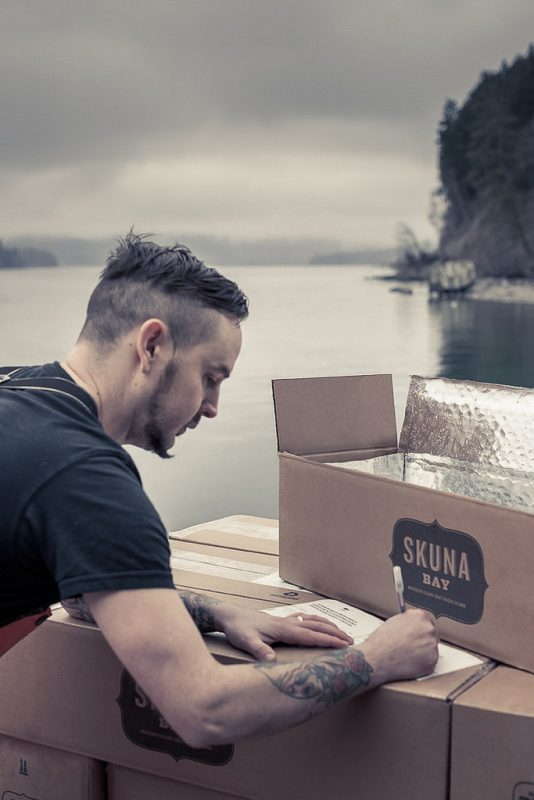Skuna Bay Salmon joins movement to offer sustainable seafood options
Partnership with James Beard Foundation paves the way for engagement with broader culinary community and North America’s top chefs.
By Samantha McLeod
SeaWestNews
Vancouver Island’s Skuna Bay Salmon, globally renowned for its sustainable fishing and farming practices, has joined a national movement to strengthen the world’s seafood supply chain.
Committed to offering sustainable seafood options, Skuna Bay said it has become an official
James Beard Foundation (JBF) Impact Program Sustainable Seafood Partner.
This partnership unites Skuna Bay with the broader culinary community supported by JBF through their Impact Program work.
According to the Food and Agriculture Organization of the United Nations, more than 90 percent of the world’s fisheries are either fully fished or overfished, making the preservation of marine life and diversification of seafood purchasing habits more important than ever.
“Seafood purveyors like Skuna Bay are experts on the complex seafood supply chain and the benefits of sustainable fishing and farming,” said Katherine Miller, senior director of Food Policy Advocacy for the James Beard Foundation.
“Becoming a Sustainable Seafood Partner allows them to share their unique expertise with chefs and other restaurant professionals, bringing both sides of the industry together to change the way we think about the seafood on our plate.”
As part of the Sustainable Seafood Partnership program, participating seafood purveyors commit to offering products with a Monterey Bay Aquarium Seafood Watch rating of “Yellow” or better.
They will also contribute to discussions on critical topics related to sustainable seafood at industry events and public forums across the country, including the James Beard Foundation’s Sustainable Seafood Issue Summits and Culinary Labs.
“We at Skuna Bay Salmon are proud to be a founding partner of the James Beard Foundation’s Sustainable Seafood Impact Program,” said Dave Mergle, Founder of Skuna Bay Salmon.
Mergle said Skuna Bay’s relationship with the James Beard Foundation and the broader culinary community has allowed it to engage America’s top chefs on a commitment to excellence over cost, elevating the standards of all seafood harvesters and connecting its Craftsman Farmers with people who care about how their food is raised.
Assuring stable fishing stocks and promoting environmentally responsible seafood options aligns directly with the James Beard Foundation’s central mission to make America’s food culture more delicious, diverse, and sustainable for everyone.
This new initiative supports the James Beard Foundation Impact Programs, which showcase the organization’s commitment to establishing a more sustainable food system through education, advocacy, and thought leadership.
Here are the first four JBF Sustainable Seafood Partners:
Australis Barramundi knows that if we relied on wild fish alone, meeting our recommended two servings of fish a week would require four planet Earths. With this in mind, they’re working to make a hearty species of fish called barramundi a household name. By diversifying seafood options on menus in restaurants and at home, and by leveraging the minimal environmental impact of this fish, they’re ensuring healthier oceans for years to come.
Blue Ocean Mariculture is the only open aquaculture farm in the United States, and the sole producer of Hawaiian Kanpachi. Farming a sashimi-grade species of yellowtail called kanpachi in the ocean off Hawaii sounds idyllic, but more importantly, it’s sustainable. Blue Ocean started with 15 wild fish as a brood stock and since then has brought half a million sustainably grown kanpachi to market.
Skuna Bay craft-raises salmon in a natural ocean environment off Vancouver Island and stores fish in recyclable packaging during transport. At the center of their farming practices is an understanding that our planet needs more protein, and that increasing accessibility to sustainable seafood with the lowest carbon-generating food production systems on this planet is the best way to meet that demand.
Verlasso raises salmon in Chilean Patagonia and was the first ocean-raised Atlantic salmon rated “Yellow” (or “Good Alternative”) by the Monterey Bay Aquarium Seafood Watch. Verlasso knows that sustainability in seafood is about balance, and brings this perspective into their approach to supporting the local Chilean economy and maintaining a healthy ocean environment.
For more information about this program and other James Beard Foundation sustainable seafood initiatives, visit www.jamesbeard.org/sustainable-seafood-standards.
Related story
Go here to see a video to see the Skuna Bay craftsman salmon farmers story

